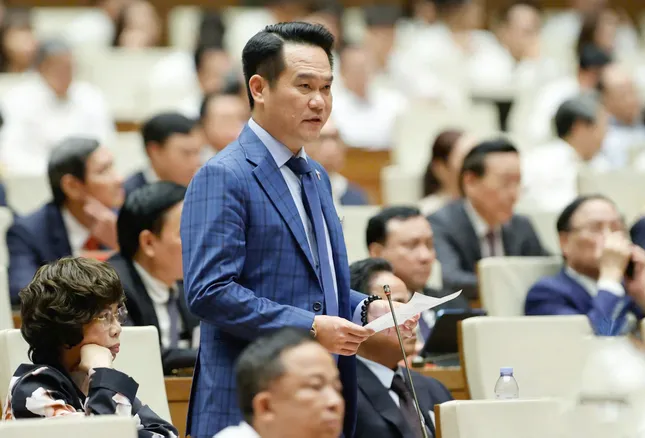The Vietnam Young Entrepreneurs Association believes that if the additional fee of 5.4% per year is still applied to unpaid land use fees, it will create a paradox, pose many legal risks and cause a burden for businesses.
According to the Vietnam Young Entrepreneurs Association (VYEA), according to feedback from member businesses and through surveys, there is a content in the draft amendment to Decree 103 (regulations on land use fees and land rents) that is causing many concerns and worries for businesses.
Accordingly, in the draft amendment to Decree 103, the Ministry of Finance is planning to maintain the additional collection rate of 5.4% per year for the unpaid land use fee.
Specifically, the draft states: "The amount of money that land users must pay additionally for the period when land use fees have not been calculated according to the provisions of Point d, Clause 2, Article 257 of the Land Law is calculated at the collection rate of 5.4% per year calculated on the amount of land use fees payable as determined according to the provisions of Clause 2, Article 257 of the Land Law".
According to businesses, this additional 5.4%/year is an "interest" or "late payment penalty" applied to the period in which businesses have not yet fulfilled their financial obligations regarding land. The reason is not because businesses are procrastinating, but because the authorities have not yet completed the valuation and calculation of land use fees.
At the same time, with the new regulations of the 2024 Land Law, projects that have not fulfilled their financial obligations regarding land will not be eligible to carry out the following legal procedures, including selling products to customers.
This causes businesses to be stuck with capital, unable to mobilize finance from the market or from customers themselves, causing huge losses and pushing many projects into a deadlock.
The Vietnam Young Entrepreneurs Association believes that this regulation is creating a paradox and potentially posing many legal and economic risks for businesses. Any sanctions for late payment or penalties must be based on the "fault" principle.
In this case, the delay in paying land use fees does not come from the subjective will or financial capacity of the enterprise, but from the delay in the administrative process of the competent authority. This goes against the principle of fairness and transparency in management.
At the same time, enterprises must face the reality of not being able to implement the project, not being able to mobilize capital, leading to lost opportunity costs, increased financial costs (bank loan interest) while the project is at a standstill. This is a double burden, which can push enterprises to the brink of bankruptcy or be forced to stop the project.
According to the representative of the Young Entrepreneurs Association, this regulation, if passed, will create a sense of apprehension for investors when implementing projects requiring large land areas and long land use fee calculation periods. This goes against the Government's efforts to improve the business environment and attract investment.

Chairman of the Vietnam Young Entrepreneurs Association Dang Hong Anh.
Chairman of the Vietnam Young Entrepreneurs Association Dang Hong Anh said that the business community in general and the Vietnam Young Entrepreneurs Association in particular are very interested in the above content, and recommended that reasonable adjustments be made, including the proposal to eliminate the additional 5.4%/year.
For cases where enterprises are affected by delays in land valuation and land use fee calculation by competent authorities, this additional fee should be completely canceled. Administrative responsibility should be clearly assigned to the "at fault" agency.
According to Mr. Hong Anh, the above application needs to be selective. The additional 5.4%/year should only be applied to cases where competent authorities have completed the calculation of financial obligations and notified the enterprise, but the enterprise then fails to fulfill its payment obligation on time.
Or, the application can be implemented when the enterprise clearly benefits from this delayed payment process, such as taking advantage of the unpaid amount for profitable investment.
“The Vietnam Young Entrepreneurs Association believes that removing this obstacle will not only bring fairness to businesses that are suffering losses, but also demonstrate the State’s practical support and companionship with the business community.
A fair, transparent, and predictable land policy will be a solid foundation for businesses to confidently invest, develop, and contribute to the sustainable growth of the Vietnamese economy.
We hope that the voice from practice will be heard and transformed into reasonable and timely legal regulations,” said Dang Hong Anh, Chairman of the Vietnam Young Entrepreneurs Association.
According to Tien Phong